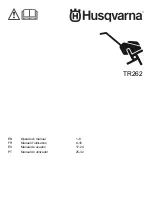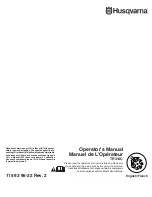
READ ALL INSTRUCTIONS BEFORE OPERATING
•
Carefully read and understand the operator's manual of the unit
that powers this attachment.
•
Read the instructions carefully. Be familiar with the controls and
proper use of the unit.
•
Do not operate this unit when tired, ill or under the influence of
alcohol, drugs or medication.
•
Children must not operate the unit. Teens must be accompanied
and guided by an adult.
•
All guards and safety attachments must be installed properly
before operating the unit.
•
Inspect the unit before use. Replace damaged parts. Check for
fuel leaks. Make sure all fasteners are in place and secure.
Replace parts that are cracked, chipped, or damaged in any
way. Do not operate the unit with loose or damaged parts.
•
Carefully inspect the area before starting the unit. Remove all
debris and hard or sharp objects such as glass, wire, etc.
•
Be aware of the risk of injury to the head, hands and feet.
•
Clear the area of children, bystanders and pets; keep them
outside a 50-foot (15 m) radius, at a minimum. Even then, they are
still at risk from thrown objects. Encourage bystanders to wear
eye protection. If you are approached, stop the unit immediately.
SAFETY WARNINGS FOR GAS UNITS
•
Store fuel only in containers specifically designed and approved
for the storage of such materials.
•
Always stop the engine and allow it to cool before filling the
tank. Never remove the fuel tank cap or add fuel when the
engine is hot. Always loosen the fuel tank cap slowly to relieve
any pressure in the tank before fueling.
•
Always mix and add fuel in a clean, well-ventilated outdoor area
where there are no sparks or flames. DO NOT smoke.
•
Never operate the unit without the fuel cap securely in place.
•
Avoid creating a source of ignition for spilled fuel. Wipe up any
spilled fuel from the unit immediately, before starting the unit.
Move the unit at least 30 ft. (9.1 m) from the fueling source and
site before starting the engine. DO NOT smoke.
•
Never start or run the unit inside a closed room or building.
Breathing exhaust fumes can kill. Operate this unit only in a well
ventilated outdoor area.
• IMPORTANT SAFETY INSTRUCTIONS •
WARNING:
When using the unit, all safety
rules must be followed. Please read these instructions
before operating the unit in order to ensure the safety of
the operator and any bystanders. Please keep these
instructions for later use.
WARNING:
Gasoline is highly flammable and
its vapors can explode if ignited. Take the following
precautions:
3
SAFETY WARNINGS FOR ELECTRIC UNITS
•
CORD SETS: Make sure your cord set is in good condition.
When using a cord set, be sure to use a cord that is heavy
enough to carry the current that your unit will draw. An
undersized cord set will cause a drop in line voltage resulting in
loss of power and overheating. See the operator’s manual for
the unit that will power this attachment for the recommended
cord size.
•
Inspect all extension cords and the unit power connection
periodically. Look closely for deterioration, cuts or cracks in the
insulation. Also inspect the connections for damage. Replace
the cords if any defects or damage appear.
•
Prevent disconnection of the power head from the extension
cord during operation by using a plug-receptacle retaining strap,
connector, or by making a knot (Fig. A).
•
Avoid dangerous environments. Never operate your unit in damp
or wet conditions. Moisture is a shock hazard.
•
Do not use the unit in the rain. Do not use in or around water.
•
Do not handle the plug or unit with wet hands or standing on
any wet surfaces.
•
Do not leave the unit plugged in when not in use, changing
attachments or while being serviced.
WARNING:
To reduce the risk of electrical
shock, use only extension cords approved for outdoor use,
such as an extension cord of cord type SW-A, SOW-A, STW-
A, STOW-A, SJW-A, SJOW-A, SJTW-W or SJTOW-A.
Extension cords are available from your local retailer. Use only
round-jacketed extension cords approved for outdoor use.
Fig. A
Unit Power Cord
Extension Cord




































